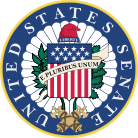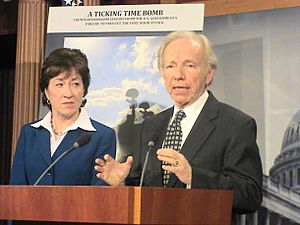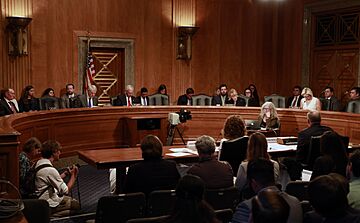United States Senate Committee on Homeland Security and Governmental Affairs facts for kids
| Standing committee | |
|---|---|
Active United States Senate 118th Congress |
|
| History | |
| Formed | October 9, 2004 |
| Succeeded | Committee on the District of Columbia (1816) Committee on Post Office and Civil Service (1816) Committee on Retrenchment (1842) Committee on Expenditures in the Executive Departments (1921) Committee on Government Operations (1952) Committee on Governmental Affairs (1978) |
| Leadership | |
| Chair | Gary Peters (D) Since February 3, 2021 |
| Ranking member | Rand Paul (R) Since January 3, 2023 |
| Structure | |
| Seats | 15 members |
| Political parties | Majority (8)
|
| Jurisdiction | |
| Policy areas | Accounting standards, Census, Compliance audit, Federal civil service, Federal Protective Service, Federal statistics, Financial audit, Freedom of information, Government of the District of Columbia, Governmental accounting, Homeland security, Mail, National archives, Nuclear export policy, Organization and reorganization of the executive branch of government, Performance audit, Public procurement, Records management, United States budget process |
| Oversight authority | Cybersecurity and Infrastructure Security Agency, Department of Homeland Security, Domestic Nuclear Detection Office, Government Accountability Office, Federal Emergency Management Agency, General Services Administration, National Archives and Records Administration, Office of E-Government & Information Technology, Office of Federal Financial Management, Office of Federal Procurement Policy, Office of Information and Regulatory Affairs, Postal Regulatory Commission, United States Capitol Police, United States Census Bureau, United States Office of Management and Budget, United States Office of Personnel Management, United States Postal Service, United States Secret Service, Washington, D.C., White House Office of Intergovernmental Affairs |
| House counterpart | House Committee on Homeland Security, House Committee on Oversight and Reform |
| Meeting place | |
| 340 Dirksen Senate Office Building Washington, D.C. |
|
| Rules | |
|
|

The United States Senate Committee on Homeland Security and Governmental Affairs is a very important group of lawmakers in the U.S. Senate. It is the main committee that watches over how the government works. This includes everything from keeping our country safe (homeland security) to making sure government offices run smoothly.
The committee looks at the Department of Homeland Security and other safety issues. It also checks on groups like the National Archives and Records Administration, which keeps important government documents. They also deal with the United States Census, which counts everyone in the country. The committee also oversees the United States Postal Service and the government of Washington, D.C.. Before 2004, it was just called the Committee on Governmental Affairs. Homeland security was added to its name and duties after that. This committee is known for investigating important issues. Its leader, called the Chairman, can even ask for official documents without a full committee vote.
Contents
How the Committee Started
The idea for this committee goes back a long time, even to the 1800s. But its modern form began in 1921. Back then, it was called the Committee on Expenditures in the Executive Departments. This committee checked how government money was spent.
In 1952, its name changed to the Committee on Government Operations. Then, in 1978, it became the Committee on Governmental Affairs. After the Intelligence Reform and Terrorism Prevention Act was passed in 2004, the committee got its current name. It became the Committee on Homeland Security and Governmental Affairs. This change added homeland security to its main jobs.

One of its oldest and most famous parts is the Permanent Subcommittee on Investigations. This group was created in 1952. Other subcommittees were added over time to help with different tasks. For example, some subcommittees focus on how the government manages its workers. Others look at how money is handled or how the government shares information.
After 2007, new subcommittees were formed to deal with homeland security. These included groups focused on disaster recovery and how states and local areas prepare for emergencies. In 2011, some of these groups merged to work together even better.
Over the years, this committee has worked on many important topics. These include making sure the government is responsible and ethical. They also look at how government rules affect people. After the Department of Homeland Security was created in 2002, this committee became its main supervisor.
In recent years, the committee has focused on big challenges. They have looked at how the Department of Homeland Security responds to major disasters. A good example is their work after Hurricane Katrina. They also study how to stop terrorism that starts inside the United States. Another key area is protecting important computer networks. These networks control things like our power, water, and transportation.
In 2014, a report from the committee found problems with government computer passwords. It said some passwords were not strong enough to protect important information.
What the Committee Does
The Senate Homeland Security Committee has many important responsibilities. It reviews new laws and other matters related to these topics:
- Keeping the National Archives safe.
- Checking government budgets and how money is spent.
- Overseeing the Census and collecting statistics.
- Looking at how the U.S. Congress is organized.
- Supervising the Department of Homeland Security.
- Managing the federal government's employees.
- Making sure government information is available to the public.
- Handling relationships between the federal government, states, and cities.
- Dealing with the local government of Washington, D.C..
- Looking at how the U.S. handles nuclear exports.
- Organizing and reorganizing different parts of the government.
- Overseeing the United States Postal Service.
- Checking on the status, pay, and benefits of government workers.
The committee also has other important duties:
- It reviews reports from the Government Accountability Office. This office checks how well government agencies are doing.
- It studies how efficient and effective all government agencies are.
- It checks if laws made to reorganize the government are working.
- It studies how the U.S. government works with states, cities, and international groups.
Who is on the Committee?
The committee has members from both major political parties. Here are the current members for the 118th Congress:
| Majority | Minority |
|---|---|
|
|
The committee also has smaller groups called subcommittees. These groups focus on specific areas:
| Subcommittee | Chair | Ranking Member |
|---|---|---|
| Emerging Threats and Spending Oversight | Maggie Hassan (D-NH) | Mitt Romney (R-UT) |
| Government Operations and Border Management | Kyrsten Sinema (I-AZ) | James Lankford (R-OK) |
| Investigations (Permanent) | Richard Blumenthal (D-CT) | Ron Johnson (R-WI) |
Committee Leaders Over Time
Many different senators have led this committee throughout its history. Here are the senators who have served as the Chairman of the committee since 1921:
Committee on Expenditures in Executive Departments (1921–1952)
- Medill McCormick (R-Ill.) 1921–1925
- David A. Reed (R-Pa.) 1925–1927
- Frederic M. Sackett (R-Ky.) 1927–1930
- Guy D. Goff (R-W.Va.) 1930–1931
- Frederick Steiwer (R-Ore.) 1931–1933
- J. Hamilton Lewis (D-Ill.) 1933–1939
- Frederick Van Nuys (D-Ind.) 1939–1942
- J. Lister Hill (D-Ala.) 1942–1947
- George D. Aiken (R-Vt.) 1947–1949
- John L. McClellan (D-Ark.) 1949–1952
Committee on Government Operations (1952–1977)
- John L. McClellan (D-Ark.) 1952–1953
- Joseph R. McCarthy (R-Wis.) 1953–1955
- John L. McClellan (D-Ark.) 1955–1972
- Samuel J. Ervin Jr. (D-N.C.) 1972–1974
- Abraham A. Ribicoff (D-Conn.) 1974–1977
Committee on Governmental Affairs (1977–2005)
- Abraham A. Ribicoff (D-Conn.) 1977–1981
- William V. Roth, Jr. (R-Del.) 1981–1987
- John H. Glenn, Jr. (D-Ohio) 1987–1995
- William V. Roth, Jr. (R-Del.) 1995
- Theodore F. Stevens (R-Alaska) 1995–1997
- Fred D. Thompson (R-Tenn.) 1997–2001
- Joseph I. Lieberman (D-Conn.) 2001
- Fred D. Thompson (R-Tenn.) 2001
- Joseph I. Lieberman (D-Conn.) 2001–2003
- Susan M. Collins (R-Maine) 2003–2005
Committee on Homeland Security and Governmental Affairs (2005–present)
- Susan M. Collins (R-Maine) 2005–2007
- Joseph I. Lieberman (I-Conn.) 2007–2013
- Tom Carper (D-Del.) 2013–2015
- Ron Johnson (R-Wis.) 2015–2021
- Gary Peters (D-Mich.) 2021–present
See also
 | Calvin Brent |
 | Walter T. Bailey |
 | Martha Cassell Thompson |
 | Alberta Jeannette Cassell |


